- Home
- Jason McIntyre
Deathbed (Dovetail Cove, 1971) (Dovetail Cove Series) Page 2
Deathbed (Dovetail Cove, 1971) (Dovetail Cove Series) Read online
Page 2
The tin that was the biggest—and in the best condition—was one in baby blue called Old Chum Virginia Flake Cut. It had a nice design with curlicue letters that Farrah liked quite a lot. Still, she felt a bit of disappointment at the lot. She told herself, Ah, well, not every find can be a real humdinger. That was another of Gran’s phrases: humdinger. She climbed up on the bed and laid her head down on her pillow. It was hot in here.
At a distance, she heard her dad call out one final goodbye over the volume of the record player. He was heading back to town, back to his office, back to work. She knew he was important, maybe one of the most important men in town. But Farrah spent a lot of time alone—particularly over summer holidays, and particularly since Mom had left. Mom hadn’t really moved out. Her stuff was all here. But she was gone nonetheless. And long distance calls to the mainland were expensive. They’d only talked a handful of times.
The front door slammed and in a couple of minutes, Farrah heard her dad’s police cruiser start and drive off down the lane before braking at the end and then fading off to blend in with the noises of the early evening: birds, and wind in the trees, a bit of the distant surf and a gull crying somewhere.
Looking down at the open black tin by her bruised right leg, Farrah felt a pang of regret. A bit for the fact that there were no plans for a phone call from Mom tonight. Regret that Jamie hadn’t come with her to the market today like she’d promised. Regret that Farrah had wasted fifty cents on something that wouldn’t have any value unless she held onto it for another twenty-five years. But mostly regret that the story inside the Mystery Box was over so quickly. It had held a story. But a tiny one. All she’d learned is that it had likely belonged to one of the workmen or fishermen that staggered in after a stint on the water and spent their leave flirting with girls (though, thankfully, not usually any as young as Farrah or her friend Jamie) on Main Street or down near the Beacon Street Bar.
It was likely a single guy, Farrah thought. Most of them were. She knew about how DC had some girls older than her who catered to those transient sorts. She didn’t know exactly what they did, but Jamie knew and she’d filled in a few of the blanks for Farrah.
So, yeah. That was pretty much it—the whole story of the mystery box’s owner in a nutshell. He was a fisher who smoked and chewed. Yeah. Not very exciting.
Feeling deflated, Farrah gave the tin a kick. It went off the edge of the bed and thumped to the carpet. Just another layer of the mess in this house. She rolled over.
She’d hoped there’d have been something she could take to Gran. Something that had much more of a story to it. And maybe she could climb up in Gran’s lap like she used to—either in Gran’s bed or on the couch in the back sun room—and the two of them could look through the contents of the box together, piecing the life of its owner together like a puzzle.
That’s what Farrah had really wanted. That’s why she’d parted with her fifty cents this afternoon at the street market. From her father, she’d come honestly by her distrust and tendency towards suspicion. From her mother, she’d inherited a frugal and careful watchfulness and an ability to hone in on a bargain and make sure she was not coming out on the raw side of any transaction.
And from Gran—her Dad’s mom—Farrah had learned the joy of a good story.
“We all have a story to tell,” Gran had told her when she was just a little girl. “Every man, woman, child and beast has their own, and it’s almost always part of a bigger one. Some call it the greatest story ever told. I like to think that might be true. But even if it isn’t, it’s one big beautiful tapestry—all woven together in colour and the finest thread. It’s a joy to watch it weave over and under itself.”
She made up her mind then. She’d visit Gran, even if she didn’t have a gift, even if today’s find hadn’t been much of a find after all. Dad had told her that visits with Gran were numbered. To Farrah’s thinking, she had to spend as much time with her grandmother as she could this summer—especially as the old woman was one of the few conduits to her own absent mother. Mom’s own dad—Farrah’s Grandpa Danny—had become a recluse in these last years and wasn’t much for company anymore. Hearing any tidbits about her Mom from when Farrah was just a little girl, that had a value for Farrah that she couldn’t expertly express with words. But that value was far greater than any old typewriter. She’d spend as much time with Gran as she could.
She wasn’t supposed to leave the house when Dad was out—certainly not after dark...but she’d be home before he got to Gran’s. Just this once, it would be okay.
6.
On her way out, Farrah decided she’d take the black mystery box with her to Gran’s anyway. It wasn’t all that exciting, but maybe Gran would be having a good day. Maybe they’d look at it together and something in the tin would spark a memory—and thus a story—from Gran. It couldn’t hurt.
She plopped all the old tobacco and snuff tins back in and clasped it shut again. In the crowded living room, she took the needle off the skipping record player and switched it off. She went out the back door and secured the tin back under the book straps at the back. She put her house key under her shirt. It was on a dirty grey shoelace around her neck. She would never leave the door unlocked. And the idea of coming back after dark on her bike without Dad at home did creep her out a bit. She pushed that idea out of her head. She’d put the back light on—she was sure of it—and it would light up the back part of the yard all the way to where the trees started when she got close enough to trip the motion sensor.
It was a pretty fancy gadget, one that her Dad had got through his law enforcement connections on the mainland. Farrah liked it. Mostly. She hated it when she was in bed, waiting for sleep to come, telling herself stories in her head while she tried to simultaneously think drowsy thoughts—and the thing snapped on. Usually it was just the wind, or maybe a squirrel. But she had a vivid imagination. And she usually pictured some crouching beast back there, stumbling out of the thick wood and into the Birkhead Half Acre (as her Dad jokingly called their plot). The creature would be part human and part...something else. It would be dripping some kind of juicy saliva from teeth that were oversized, and closer to an animal’s fangs, and it would be dressed in rags.
Brrr. The evening had chilled off a touch now that the sun had dropped. It had to be that, Farrah told herself as she mounted her bike. She pushed the idea of the ‘manimal’ out her head and considered the idea of getting her bike helmet from the shed. They weren’t just for sissies. Or maybe they were, she thought—if sissies worried about getting wigged out in the dark, clipping a tree root with the front bike tire, and doing a bum-over-head flip into the scrub.
No, she decided. I’m fine. Big girls can handle anything. She’d put on her red-hooded sweatshirt that Dad had gotten her from the Space Needle last fall. Good thing.
She flicked on her bike’s headlamp and started pedalling, instantly feeling that cool wind off the Pacific tousling her hair and building colour in her cheeks. With the effort of her feet doing the work, the lamp lit up a path out in front of her and she headed off to Gran’s.
Despite her initial efforts at giving herself a major case of the heebie jeebies, she took the back lanes and the paths between properties. It was faster by a lot. And besides that, Gran had always told her—when Gran was still healthy enough to pilot her truck, “You learn more about a household when you see it from the back yard.”
“Front lanes,” Gran said, “are for Sunday morning pleasantries. Front yards are for greeting neighbours over the hedge and serving tea to guests in the good china. But back yards are where the honest truth sits and waits to be told.”
Behind Farrah in the darkening press of the woods, the black metal mystery box rattled along with contents that were much heavier than only a few tobacco tins.
7.
By the time Farrah got to Gran’s it was full-on dark with no stars, though it was hard to tell whether it was overcast from under the canopy of black afforded by the fo
liage. Farrah’s throbbing headlamp bled into the rays shone by Gran’s porch light.
The living room was lit up too and the wide picture window showed all the lamps on. Nurse Anne was in there on the couch and reading a book. When she saw movement at the window she gave a start but realized it was Farrah on her bike and waved at the girl to come on in.
Gran’s front door was unlocked.
Coming in and trying to catch some breath, Farrah said, “How’s she doing tonight?”
Nurse Anne gave a medium-sized smile. “She’s...okay,” was her response. Farrah had learned to gauge a lot based on those two things: the size of Anne’s smile and the words she chose to describe Gran’s state. Medium smile plus ‘okay’ was code for not terrible, but not great either. That was par for the course the last few weeks.
“Can I go in? I have something to show her.” Farrah was carrying her black mystery box.
“Sure,” Nurse Anne said with an attitude that was unspoken but said, Can’t hurt. “But just peek first. If she’s sleeping, don’t wake her.” Can’t hurt, her tone said. Won’t help, mind you, but it can’t hurt.
Farrah gave a big, wordless nod and kicked off her sandals in a haphazard pile next to Nurse Anne’s and a pair of Gran’s she likely hadn’t worn in a few months.
She went down the short hall—Gran’s house was lots smaller than her son’s and daughter-in-law’s. At Gran’s room, she peeked in through the cracked door. Gran was in bed with a layer of three or four of her heaviest afghans and comforters spread over her thin frame. Gran’s head was lolled towards the big window. In daytime that window showed her a lovely view of her now overgrown garden. Tonight it was a solid pane of dark chocolate that reminded Farrah of the cooked puddings her mom made on the stovetop. Mixed with the chocolate were little snippets of leaves that bled into the nothingness of the night. Overlaid on top of that was a mirror image of the room, swimming in a faded portrait.
Knowing she shouldn’t go in and wake her, Farrah put fingertips on the doorway. Without meaning to—honestly!—the door moved an inch or two. It squeaked on old hinges, likely swollen in the humidity of the night.
Gran turned to look toward the doorway. Her eyes were open—Farrah wasn’t sure if they had been since the start—and she crinkled her already wrinkled face. One side was frozen from her paralysis. “Who’s there?” she said in a whisper that probably wasn’t meant to be one. “I don’t have my glasses.” Only one half of her mouth moved and she spoke with a new and prominent lisp. One eye was open wider than the other, too. Farrah was never sure if the weak one could see at all anymore. Maybe glasses didn’t matter for Gran.
Caught, but feeling some relief that Gran was awake now, Farrah pushed farther into the room. Copying her gran’s volume, she said. “It’s me, Gran. It’s Farrah.”
“Eh?” Gran said, cocking her head. She probably didn’t have her hearing aid in either.
“It’s Farrah,” the girl said, much louder as she came right around to the window side of the bed.
As she grew closer and larger, Farrah swam out of fuzziness and into better focus for her grandmother’s good eye. “Farrah, dear! Come here, come here!” the old woman said and Farrah did.
She had her black tin with her and set it on her lap. “Gran! Do you want to see what I got today at the market?”
“Was it market day already?” Gran said in her drawl. “Did I miss it?”
Feeling a touch of sadness that Gran had missed it—and that she’d been so ignorant as to mention it—Farrah bowed her head and looked off at the panel of the window. “Yes, Gran,” she said, using her silver key to pop the latch on the black tin.
“It’s okay, dear,” Gran said, giving the girl the lightest pat on the wrist. “I’m past going out. My time for markets is done. Glad you could go on m’behalf.”
Gran had reached for her glasses on the night table, which was a jumble of pill bottles, a drinking glass with a yellow bendy straw, and a few water-ringed magazines. There was also an extra roll of intravenous tubing coiled there. Another tube ran under the afghan into Gran’s wrist. It sprouted from the far side of the bed (which is why Farrah always came to the window side) and snaked its way up to a couple of drip bags on a rack pushed back against the wall.
With great effort, Gran tried to pull herself up, using only her good side. Farrah saw the struggle and reached to help her, also getting an extra pillow to plump up behind the woman’s bony shoulders under her nightshirt. “Thank you,” she said. “Could you get Gran some water?”
Farrah did. She’d put her tin of minor treasures aside. She was itching to show them to Gran—even if they weren’t that exciting.
After Gran supped from the straw in her drinking glass, she swallowed hard a few times. That looked painful to Farrah as Gran blinked and cringed with each gulp.
“Now then,” Gran said. “What did we find?” Farrah liked that. We, as if by osmosis, Gran had come to the market with her. “Any story here?” Gran asked, a bit of unusual bounce in her voice. “Any piece of the tapestry?” Farrah knew exactly what she was talking about. She feared that the tobacco and Rexall salve tins wouldn’t be nearly enough—even for an expert like Gran—to craft a meaningful piece of the grand tapestry that Gran liked to talk about.
Farrah went to put Gran’s water glass down, and when she did, that shifted the pile of blankets and sent the black tin to the floor. It tumbled open and, with a set of clangs and clatters, the contents spilled out.
Farrah hopped down and knelt to start picking them up. Everything had come out, but what she realized was that not everything really had. The tin was deeper than she’d thought. And the bottom wasn’t exactly a false one, but it wasn’t made of black tin. It was instead, black cardboard, a bit scuffed just like the outside. When she lifted it at one bent corner, it revealed its other side as a black framing matte, the kind that she’d seen holding some of Gran’s childhood photos. It had a few gold trim bands on it, and a typewritten tag at the bottom: Smilovitch Photographers. Inside was a black and white photo of a woman, a child in short pants, a parrot, and a man with a similar haircut and beard to the fellow on the Prince Albert tin.
The photo had settled and the little boy was obscured. Farrah lifted the cover of the matte. The photo shifted inside the cardboard matte to show that the little boy was holding the parrot on one dark arm clad in a thick leather glove that went nearly to his shoulder. The look on the boy’s face was peculiar, Farrah thought. Like maybe he wasn’t all entirely...there. Hard to explain in that instant. But first impressions, Gran had often said, were nearly always correct.
This all happened in a few seconds, of course. And, by the time the front of the matte lifted and the photo shifted, a second thing slipped out from behind it and drifted into Farrah’s lap. This was a rather officious-looking document. In heavy curlicue script, it said, “Record of Incarceration.” Under that were a number of typewritten details. The most prominent was the inmate’s record number and name. The name was E. H. Oberon. The number was a longish string. Farrah sat and gaped at these new prizes.
And! There were more!
Down under the black matte, there was also an old rusted hunting knife clasped in a tattered hard leatherette sheath. Next to that was a plastic placard with a nameplate in gold embossing. It said, “D.H. Munn - Facilities Supervisor.”
And the crème de la crème: A black, leather bound notebook with at least two hundred pages in it. Farrah fanned them and saw that they were filled with the most fine, ornate, manly scrawl in black ink, and a fan of the pages showed nearly the entire book was filled with writing. The smell of the pages was of must and tobacco...and what was that? Old lager? It reminded her of a smell that Gran’s husband—Farrah’s Granddad—had smelled of when he sat on the front porch of this very house and sipped something fizzy and foamy as the sun went down. Weary, darlin’, he’d say to Farrah, who sat at his feet and paged through a hard-back picture book. I’m so weary. She remembered this clearly. She r
emembered how she didn’t see Granddad after that memory. He’s gone up to heaven, she remembered her dad telling her.
She held the leather-bound treasure with all its words and looked up at Gran, who was staring down at her with silent interest and, admittedly, a bit of raw anticipation in her wrinkled and twisted face. With her paralysis more prominent than before, Gran asked, “What you got there, kiddo?”
Farrah stood holding the book. “A story,” she said, proudly.
8.
Gran had been playing games of wist on a tray with Farrah only two weeks ago. Only two weeks ago, there’d been colour in her cheeks and she was walking to the couch and having a little tea in the morning sun at the dining room table.
Now was a different story. Farrah, even at twelve and a half, could see just exactly how different.

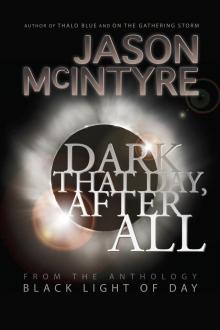 Dark That Day, After All
Dark That Day, After All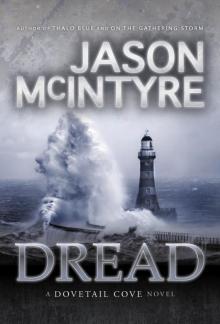 Dread
Dread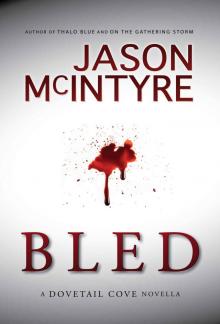 Bled
Bled Instead
Instead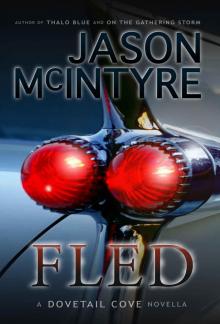 Fled
Fled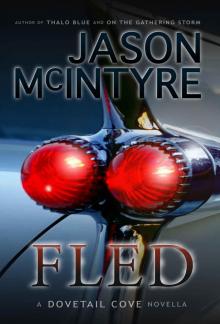 Fled (Dovetail Cove, 1973) (Dovetail Cove Series)
Fled (Dovetail Cove, 1973) (Dovetail Cove Series)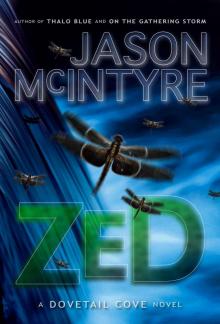 Zed
Zed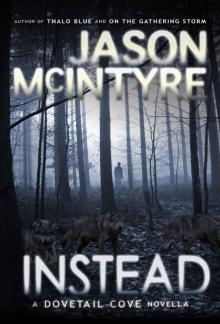 Instead (Dovetail Cove, 1979) (Dovetail Cove Series)
Instead (Dovetail Cove, 1979) (Dovetail Cove Series)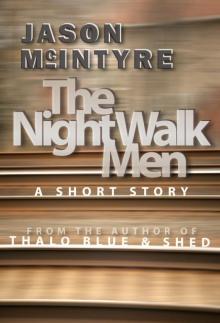 The Night Walk Men
The Night Walk Men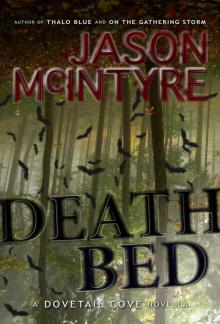 Deathbed (Dovetail Cove, 1971) (Dovetail Cove Series)
Deathbed (Dovetail Cove, 1971) (Dovetail Cove Series)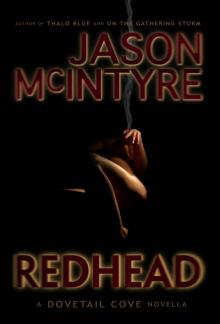 Redhead (Dovetail Cove, 1974) (Dovetail Cove Series)
Redhead (Dovetail Cove, 1974) (Dovetail Cove Series)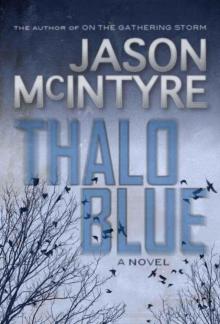 Thalo Blue
Thalo Blue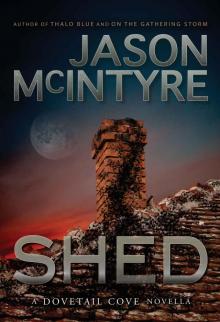 Shed
Shed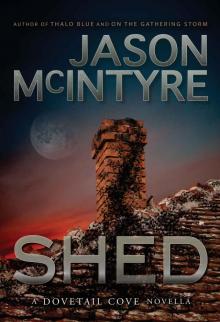 Shed (Dovetail Cove, 1977) (Dovetail Cove Series)
Shed (Dovetail Cove, 1977) (Dovetail Cove Series)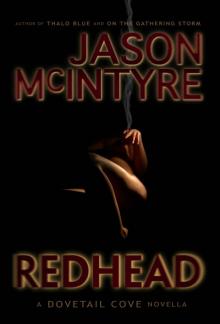 Redhead
Redhead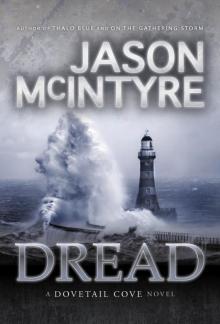 Dread (Dovetail Cove, 1978) (Dovetail Cove Series)
Dread (Dovetail Cove, 1978) (Dovetail Cove Series)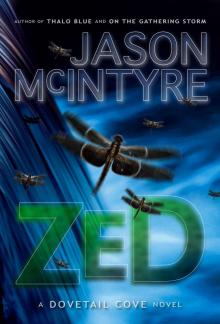 Zed (Dovetail Cove, 1975) (Dovetail Cove Series)
Zed (Dovetail Cove, 1975) (Dovetail Cove Series)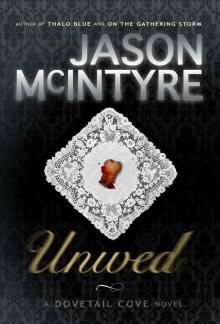 Unwed (Dovetail Cove, 1976) (Dovetail Cove Series)
Unwed (Dovetail Cove, 1976) (Dovetail Cove Series)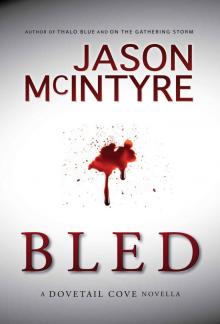 Bled (Dovetail Cove, 1972) (Dovetail Cove Series)
Bled (Dovetail Cove, 1972) (Dovetail Cove Series)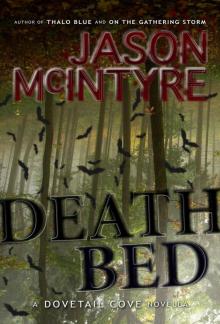 Deathbed
Deathbed